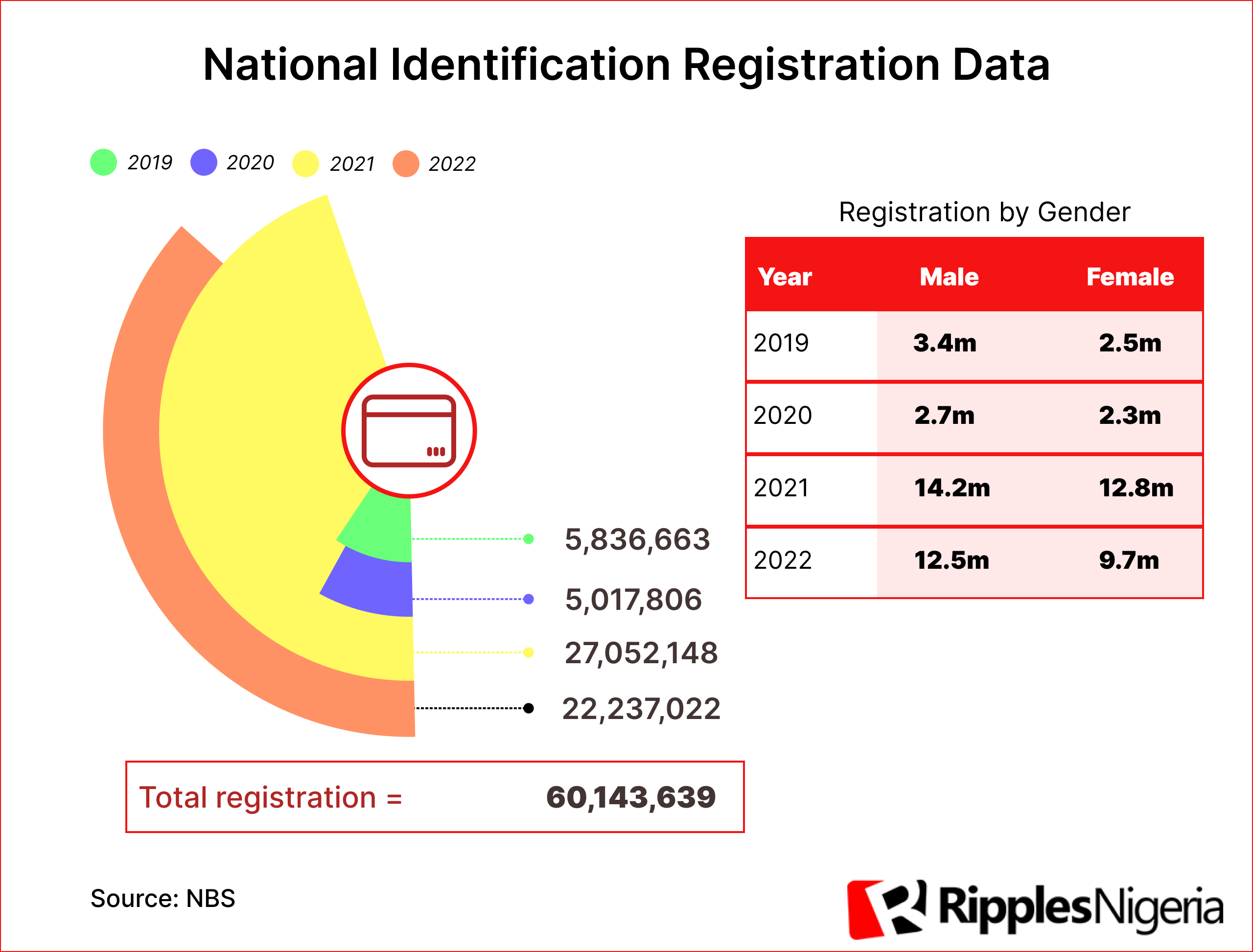Ripples Metrics
RipplesMetrics: How NIN registration grew in four years

In 2020, former president, Muhammadu Buhari, gave a directive to the telecommunication industries to block mobile numbers that have failed to link their National Identification Numbers (NINs) to their SIM cards.
This directive increased the registration of Nigerians to not only obtain their NINs but also secure the linkage to their mobile network. By the directive, failure to do this means the mobile network can bar the SIM from incoming and outgoing calls.
Ripples Nigeria documented how this process was faced with issues of fraud, extortion, strike actions and fear over database breaches.
However, within four years of the directive being passed, data provided by the National Identity Management Commission (NIMC) and validated by the National Bureau of Statistics (NBS) shows that over 60.14 million Nigerians now have their NINs.
In 2019 and 2020, the total registration and issuance stood at 5.84 million and 5.02 million respectively. However, following the directive in December 2020, the NIN registration rose to 27.05 million as of the end of 2021.
A report in June by NBS reveals that Lagos, Kano, and Kaduna had the most registrations between the years 2019 and 2021.
According to the report, Kaduna state had the most registration in 2019 with 595,284 followed by Lagos and Kano with 560,757, and 485,912 respectively. For 2020, Lagos topped the list of states with the most registration and National Identity number issued.
However, in 2021, Kano had the most registrations with 3,415,421, followed by Lagos with 3,002,693, and Kaduna with 1,434,331. In total, around 5.84 million people registered for NIN in 2019.
READ ALSO:RipplesMetrics: Effect of Tinubu’s economic policy on Nigerians in two months
Also, by gender, more men registered for NIN compared to the female gender. In 2019, 52.58% of registrants were men compared to 42.41% who were females while in 2020 women made up 45.23% and men accounted for 54.27%. For 2021, women represented 47.41% of the around 27.05 million people who registered for NIN compared to men who made up 52.59% of the population.
2022 registration data
A recent report by NBS sourced from NIMC revealed that the total registration and NIN issued stood at 22,492,748 in 2022, with 12,643,563 males and 9,849,185 females.
According to the data, the top five states with the highest number of registrations and issuance of identity numbers were Kano (2,444,224), Lagos (2,097,912), Kaduna (1,256,479), Katsina (1,156,149) and Ogun (1,075,942) while the least five states with registrations and issuance of identity numbers were Bayelsa (100,525), Ekiti (141,534), Ebonyi (165,375), Cross-River (268,904) and Kogi (308,681).
Also, the registrations and issuance of identity numbers in the diaspora totalled 255,726, distributed among 140,496 males and 115,230 females.
In 2022, the North-West Zone recorded the highest number of registrations and NIN issued with 7,207,695, while the South-East recorded the least with 1,793,373.
Recall that under the Digital Identification for Development (ID4D) project, the World Bank expects NIN enrollment to hit 148 million by June 2024.
The projections by the apex bank is to increase the number of individuals with a national ID number, issued by a robust and inclusive foundational Identification system, which facilitates their access to services. However, there are concerns that with barely two years to the target, Nigeria might fail to meet this target.
Meanwhile, the growth in the registration process has also spurred suggestions by political actors and experts to link the NIN number with voters’ cards, a development, according to them, that would aid the election process. Other suggestions revolve around how the registration can also help place a peg to determine the population of the country.
By James Odunayo
Join the conversation
Opinions
Support Ripples Nigeria, hold up solutions journalism
Balanced, fearless journalism driven by data comes at huge financial costs.
As a media platform, we hold leadership accountable and will not trade the right to press freedom and free speech for a piece of cake.
If you like what we do, and are ready to uphold solutions journalism, kindly donate to the Ripples Nigeria cause.
Your support would help to ensure that citizens and institutions continue to have free access to credible and reliable information for societal development.